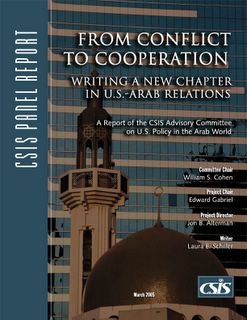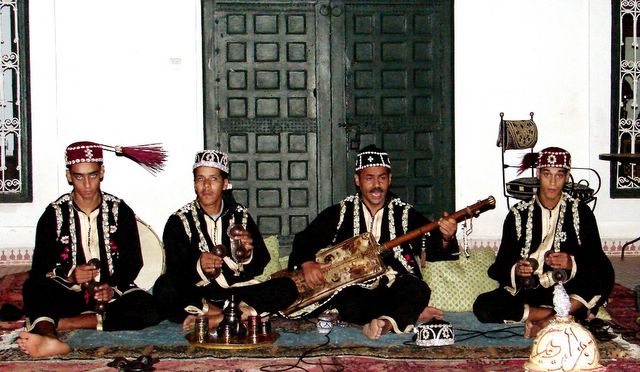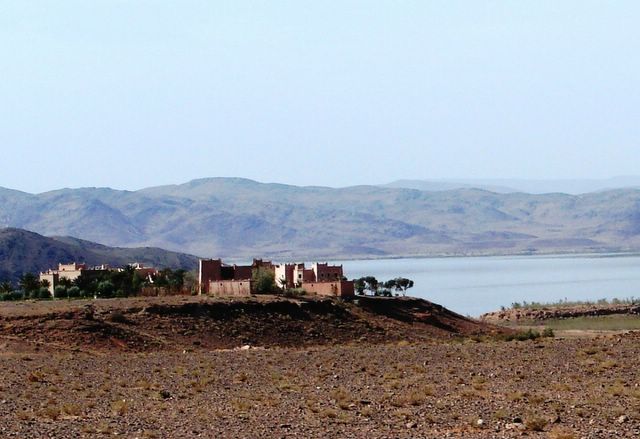"From Conflict To Cooperation: Writing A New Chapter in US-Arab Relations"
Earlier this year the Center for Strategic and International Studies (CSIS) released a report summarizing the results and recommendations of an advisory committee it brought together to address the current challenges facing America's relationship with the Middle East. The committee was headed by former Defense Secretary William Cohen and former U.S. Ambassador to Morocco, Edward Gabriel.
What makes this report different from other academic exercises that have been thrust into the public domain since 9/11 is that it willingly accepts that no advocacy could be successful without attentive inquiry; that good ideas and effective solutions can not possibly emanate from minds that do not know how to listen. This makes me recall something my own mother once told me at a young age. She said that an important part of a person's brain is its ability to recognize good ideas and that without the ability to observe and listen, one can not exercise the full scope of their intelligence. Nelson Mandela wrote in his autobiography, "Long Walk to Freedom", about how he often received credit for advancing intelligent positions, when he was merely condensing several ideas expressed by others into a concise position. Observation is after all the basis of all scientific study, except that in policy advocacy lately it appears that one knows better solely because they say so. The increasing willingness of the public to outsource their independent intellectual capacity to ill-informed, non-listening media "experts" does much to exacerbate the problem.
As to the report, many questions still remain unresolved and I still believe that it did not quite capture the divide that exists between ruling regimes and ordinary citizens of the Middle East; that it did not yet appreciate the deep ethnic, tribal, and economic divides that separate the people of the region; and that it did not fully address how its recommendations, which carry institutional impacts, can be put into practice both here in the US and in the region. In other words I did not detect an aggressive action-item agenda for implementation and a follow-up plan - nothing to give me comfort as a reader that a serious action plan is forthcoming, especially that this initiative has received almost no serious attention since the release of the report in March of this year.
Furthermore, although the report briefly cruises past the issue of American perceptions of the Middle East, I believe that not nearly enough is being done to educate Americans about the Middle East and its people. There is much talk about educating the Middle East about America, but very little on the other way around. This is possibly because we expect the free market of ideas to resolve that question for us without any need for direct intervention. I am a staunch believer in that free market of ideas but I also know that it is prone to failure and that it did much to foment hate rather than understanding in the recent years since 9/11. Therefore, responsible lawmakers in the US need to acknowledge that negative and uninformed press coverage of the Middle East and the propagandist agendas of some political actors and media mouthpieces are harmful to a strategy of rapprochement between the two peoples and do much to condone discriminatory behavior against Arab and Muslim Americans. America needs to show its goodwill towards the Middle East by first and foremost improving its treatment of those Arabs and Muslims it houses, as well as condemning hate speech in its midst.
Nonetheless, I believe that the recommendations advanced by the report including the Arab GDP Initiative, a presidential Advisory Committee on Arab Development and Growth, Private sector involvement, and education and human capital development are positive ideas that require dedicated institutional and policy resources. Yet, I can't help but be skeptical about the ability of policy makers to fully embrace such initiatives, because among other things, lawmakers have learned well how not to listen. If they are not listening to the calls of the likes of Bill Gates regarding needed education reforms to maintain U.S. global competitiveness, as well as the pleas of the US Council on competitiveness, then I doubt very much that they can let themselves accept that they have much to learn about the Middle East. Ironically, both issues (U.S. global competitiveness and the Middle East) are of critical strategic importance to the next generation of Americans, and a public obsessed with media-circus trials and reality-TV consumerism does not help either.
Click on the picture below for a full copy of the CSIS report.




























6 Comments:
Hi Jawad,
True, observation and listening are key elements in any step to be taken ahead. A serious endeavor in this respect, from all sides, would spare the world much of the hardships we are witnessing today.
"The increasing willingness of the public to outsource their independent intellectual capacity to ill-informed, non-listening media "experts" does much to exacerbate the problem."
Do you think such a willingness is increasing even though alternative medias are flourishing as never before (Internet , independent radio programs and alternative magazines)? On the other side, it is possible that the crazy rhythm today’s life is taking may make people lazier towards looking for serious information. It’s just a thought: I don’t know which factor outweighs (or will outweigh) the other.
June 23, 2005
IDB: Hope you are alive and well.
June 24, 2005
Hi Lauren: Thanks for checking on me. Doing Ok. I've just been very busy with work and a recent death in my family ruined my appetite for writing for a few days.
June 25, 2005
I'm sorry about it.
June 25, 2005
my condolences, Jawad.
June 27, 2005
Thank you Irina and Jallal. This year has been particularily harsh because in its first six months death hit three different generations of my family. First my cousin who was only 21, then my uncle, and recently my grandmother.
July 01, 2005
Post a Comment
<< Home